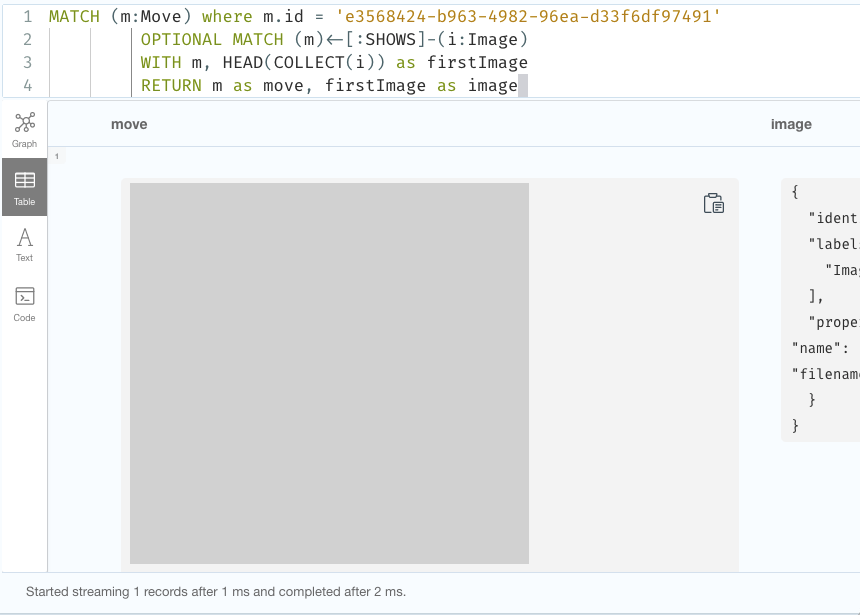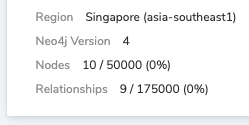Same query hitting same db - response time much slower via driver vs neo4j browser?
xharmagne opened this issue · comments
Hello, newbie here, not sure if this is a bug or expected (for some reason I'm not aware of) or if there's something I can do to speed this up -
When I run the exact same query against the same db, via neo4j browser it takes 2ms. Via neo4j driver session.run it takes 800~ms.
Any thoughts on this? Any kind of help would be appreciated :)
Neo4j Version: 4 on AuraDB free
Neo4j Mode: Single instance
Driver version: JavaScript driver 4.4.0
Operating System: macOS 11.6
Repro steps
- 1 Neo4j db on AuraDB free
- Run a query via neo4j browser - it takes 2ms

- Run same query via JS driver - query summary says consumed after 1 and available after 3, but timing says 800~ms
const driver = neo4j.driver(...);
const session = driver.session({ defaultAccessMode: neo4j.session.READ });
...
const tbefore = Date.now();
const results = await session.run(
`MATCH (m:Move) where m.id = '${id}'
OPTIONAL MATCH (m)<-[:SHOWS]-(i:Image)
WITH m, HEAD(COLLECT(i)) as firstImage
RETURN m as move, firstImage as image`
);
const tafter = Date.now();
console.log("GET MOVE: Ran query:", tafter - tbefore);
...
// process records
await session.close();
await driver.close();
Logs:
GET MOVE: Ran query: 868
Summary from results.summary:
{
query: {
text: "MATCH (m:Move) where m.id = 'e3568424-b963-4982-96ea-d33f6df97491'\n" +
'\t\t OPTIONAL MATCH (m)<-[:SHOWS]-(i:Image) \n' +
'\t\t WITH m, HEAD(COLLECT(i)) as firstImage \n' +
'\t\t RETURN m as move, firstImage as image',
parameters: {}
},
queryType: 'r',
counters: QueryStatistics {
_stats: {
nodesCreated: 0,
nodesDeleted: 0,
relationshipsCreated: 0,
relationshipsDeleted: 0,
propertiesSet: 0,
labelsAdded: 0,
labelsRemoved: 0,
indexesAdded: 0,
indexesRemoved: 0,
constraintsAdded: 0,
constraintsRemoved: 0
},
_systemUpdates: 0
},
updateStatistics: QueryStatistics {
_stats: {
nodesCreated: 0,
nodesDeleted: 0,
relationshipsCreated: 0,
relationshipsDeleted: 0,
propertiesSet: 0,
labelsAdded: 0,
labelsRemoved: 0,
indexesAdded: 0,
indexesRemoved: 0,
constraintsAdded: 0,
constraintsRemoved: 0
},
_systemUpdates: 0
},
plan: false,
profile: false,
notifications: [],
server: ServerInfo {
address: '.....databases.neo4j.io:7687',
version: 'Neo4j/4.3-aura',
agent: 'Neo4j/4.3-aura',
protocolVersion: 4.3
},
resultConsumedAfter: Integer { low: 2, high: 0 },
resultAvailableAfter: Integer { low: 4, high: 0 },
database: { name: 'neo4j' }
}
Hi @xharmagne,
are you running your JS code snippet in which environment (nodejs, chrome, firefox..) ? If you are running in firefox/chrome or other browser, I recommend you update the driver version 4.4.1 since some serialisation issues in web browsers were solved in this patch, see changelog.
I suggest you use console.time/console.timeEnd for measuring it is taking for run. For instance,
console.time('thenameofyourtime')
// Your code
console.timeEnd('thenameofyourtime')
Also worth noting that the Browser uses the javascript driver to connect.
Closed due long inactive. This issue could be re-opened if needed.
I am also facing this, using neo4j-driver v5.7.0. the issue is time consumed in neo4j browser for a query is ~20ms, while using the driver facing a huge increase in time ~370ms.
used the console.time and console.timeEnd to still the same time.
environment is nodejs:v18.
console.time('test1');
const result = await session.executeRead((tx) => tx.run(query, variables));
console.timeEnd('test1');
I'm getting the same issue still, in the auradb browser the query takes 29 ms but in my docker container running node 18 it takes around 5 seconds. It also takes around 5.5 seconds to establish an initial driver connection.


In the above "run" is the neo4j query console.time
and this is in the auradb browser. I only have 2 nodes so querying them shouldn't realistically take this long, and I would imagine that this is an issue either with the neo4j driver js package or auradb.

I will also note that the time varies, sometimes the docker one takes like 80-120 ms and sometimes it takes 5+ seconds.
Do ya'll potentially have source maps enabled on node when running your queries?
This is what I was able to narrow it down to for me.
